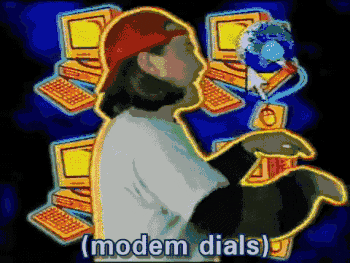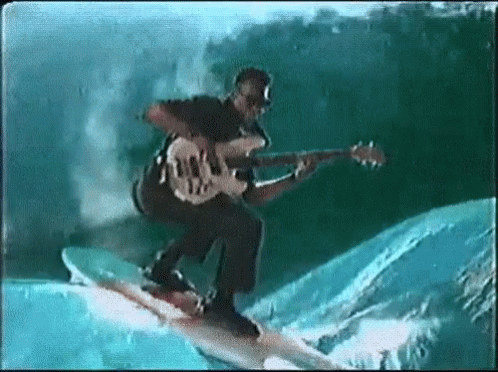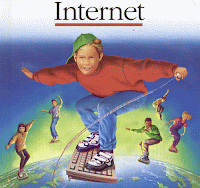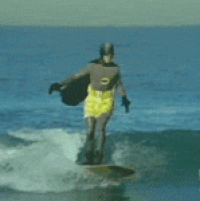
Web
Surfing!

Something to know about me is that I love web surfing. Like, when I first learned about RSS feeds in the 2000s I was quite confused as to why people would deprive themselves of the fun of typing in the URL and exploring a webpage regardless of whether anything had been posted to it lately. (Do not let my ornery nonsense put you off RSS feeds, they are fine, just not my cup of tea.) Anyway, get ready to shred some gnarly digital waves.
Neocities
- Avant Goblin: Goblins! Recipes! Peak web design!
- Bodhisattva: I wish I was this cool.
- Braigwen: Dig the medieval theme.
- Caminus: Got that geocities look, more or less. Halloween, veganism, tech, D&D, saxophone!
- Cinnamuff: Webcomics!
- Cliquespace2k: Site made to look like it was made by a teen clique in the 2000s.
- a href="https://cloudlandco.com">Cloudland: A beautiful, hand-drawn website.
- Fiddlesqueak Fables: Surreal horror, writing and puzzles.
- Fimvie: Nice looking site with lots of stuff.
- Fresh Flesh: Art. Cool horror-themed/meat look.
- Froglicking: French. Photos of liminal spaces (I know some people find them eerie, but I like looking at empty spaces), some cool music, memes of cats, and stuff.
- Garfriend: A bait shop in space! Such a pleasant site to hang out in.
- Hated Love 6: I strongly disagree with the web design choices, but the articles are very interesting.
- Irony Machine: Such a cool layout! Old internet and y2k technology showcase (including the exact Casio watch I had in primary school), pasta, music, journals, and some drag-and-drop fun stuff.
- Isawken: A page about jesters and clowns.
- Juglone: Has a guide on exploring the web through personal sites, interesting shrines, some art and a blog.
- Kopawz: Fun site with a 2000s-clutter kind of layout. Always cool to see a fellow Lupin III fan.
- Laika’s lonely planet: Words, words, words!
- Lazybones: Amazing, show-stopping, inspiring, never wanna leave.
- Less than three A game!
- Leviathren: Delightful site. Focuses on web revival.
- Mewlecules: Everything. Everything about it! I extra love the fashion shrine, but everything is just so great!
- Neko no Kuni: Cats! Cats! Cats!
- Neon Riser: Mainly a dream journal, but the Sitekick shrine enthralled me despite my having never even heard about the game before.
- NewOrigami: All sorts of origami patterns.
- Ninacti0n: Hand-drawn site. Always lovely to see.
- Noat: A cool-looking blog I enjoy reading.
- NoiseCorvid’s Scarecrow shrine. The rest of the site is super cool and horror-centric too, I just really love Scarecrow.
- Nonexistent Fandoms Fandom: A site made to introduce people to the webmaster’s favorite obscure media.
- Nucky Zone: A site full of wisdom, truly.
- Primordial Dungeon: Such an enjoyable experience. Lots of things to click on.
- Park Action: Art project with a layout that works on mobile.
- Pixel Graveyard: Pixel art, a cool Invisible Man shrine, and a general cute ghost aesthetic.
- Purple Hello 98: A nostalgic-looking site.
- Rhzartist:
An eternally curious artist, bridging the gaps between illustration, ceramics, ecology, and advocacy.
I like her pages about snakes. - Sammy Lux: Horror-centric. Art and movie reviews.
- Sea Star! A single page, dedicated to expressing joy about marine biologists renaming starfish to sea stars.
- Solita: Lovely site.
- Star-Specimen: Nostalgic horror stuff! Also, I discovered an animal through the critter page.
- Sunny’s Video: A Blue-Ray and DVD shop? They have a review section and a podcast, too.
- Tacky Villain On-line: love everything about it.
Layout templates
Just because templates didn’t work out for me doesn’t mean other people shouldn’t use them. They’re literally made to be used by people.

- Itinerae
- Nenrikido
- Testing Range
- Nomnomnami
- Repth
- Wishglows
- Re-nata
- Shangairomance
- Shenanigans
- Codesharing
- Punkwasp
- Neocities themes on Github
Stock and Free to Use Graphics
- unsplash.com
- creepyhalloweenimages.com
- hallowdaze
- controlcoreangel
- Red and black blinkies, stamps, backgrounds, and dividers on SpaceHey
- Early 2000s emo/scene graphics on SpaceHey
Learning to code
I listed some sources that helped me on the about the site section of my home page, but here are some more. (Tip: learn the foundamentals before looking for more specific tutorials.)
- Computer Basics
- Justice For HTML/CSS: How These Languages Built The 2000s Internet & Launched Countless Tech Careers:
A programming language is a set of instructions that a programmer writes for a computer to follow and perform a task. HTML/CSS technically don’t contain traditional programming logic, so they’re not true programming languages. HTML is a “markup language” and CSS is a “style sheet”—together, they determine how content is displayed on a web page. The main difference is that markup languages don’t follow logic or algorithms and instead just consist of formatting instructions for data. As you can see, what this distinction obscures is how powerful and important HTML/CSS are: Without these tools, the websites you rely on today for everything from socializing to shopping to working would be fragmented and incredibly bland.
- What is code?
- Your first website: guide on MDN.
- HTML Dog: Everything HTML, CSS, and JavaScript, the most common languages used in making web pages (and the only supported languages on static web hosts like Neocities).
- Learn The Web:
Our mission is to make critical skills like computer programming accessible and enjoyable for people of all backgrounds.
Simple courses for beginners with zero previous knowledge. - Code Guide: Standards for writing HTML and CSS in a way that is easy to read and mantain.
- The Role of CSS and HTML Validators: A Comprehensive Guide
- HTML reference
- HTML cheatsheet
- CSS reference
- CSS cheatsheet
- HTML for People: Focuses on creating a Neocites website.
- CSS Tip: Learn CSS the easy way.
- The difference between the strong, b, em, and i HTML tags
- The Odin Project: I found a lot of the foundational course interesting and useful despite having no current desire for switching my OS to Linux (backing up so many files would be a chore) or using Git or the Command Line. They brush over the HTML and CSS very briefly, but luckily I already knew the basics going in. The real focus is on the JavaScript so if your goal is to make a Neocities website Free Code Camp or the sites I listed above would probably be a better starting point for that.
- Eloquent Javascript: Ebook freely available to read online.
- A post about how to make website-making easier for beginners.
- Image performance and compression. Please, I am begging you to compress your images so that your pages don’t take 80 years to load. Please.
- A guide to subsetting fonts. Same principle as compressing image file size: lighter file size makes it load faster.
- Web Glossary: A dictionary of coding and programming terms.
- Checking your website’s responsiveness? You can simulate mobile screens (and any other device, really) using your computer browser’s devtools.
A11y (web accessibility)
- A11y Coffee: Intro to web accessibility.
- A11y Tools: A random collection of accessibility-focused tools that you might find at least partially useful.
- Random A11y: Endless collection of accessible color combos.
- How to write alt text for memes
- All Acessible: Web accessibility tips and insights.
- The Sustainable Dev: tips and tricks to make websites more sustainable.
- Cloud Four: Blog about responsive web.
- Manuel Matuzovic’s blog: Specialized in HTML, accessibility, and CSS layout and architecture.
Fun coding stuff
- Sunday Sites: A place to write code and socialize on a Sunday every month. Sadly, by the time I discovered it they seem like they already stopped doing it, but they archived the prompts and some of the sites they made.
- Just For Fun: A showcase of creative coding projects.
- Want inspiration for a layout? Check the Web Design Museum
- 32bit Cafe: An online community for adults to converge in safe-for-work discussions about the webweaving, webcrafting, website-building hobby that focuses on self-expression and art without heavily focusing on that “old web” aesthetic or focusing on nostalgia.
- Max Böck’s blog
- Nayuki’s blog
- ComiCSS: Webcomic about CSS, made with CSS.
- Weird Web October: Prompt challenge to create a page each day of the month.
- Flexbox Adventure: A game for learning and practicing CSS flexbox properties.
- CSS Grid Attack: A game for learning and practicing CSS grid properties.
- CSS Sundae: A short tutorial for learning and practicing CSS position properties.
- 100 things to add to your website and 100 more things to add to your website
- /slash pages:
Slash pages are common pages you can add to your website, usually with a standard, root-level slug like /now, /about, or /uses. They tend to describe the individual behind the site and are distinguishing characteristics of the IndieWeb.
The small, indie, personal web

- Switching.Software: Ethical, easy-to-use and privacy-conscious alternatives to well-known software.
- Reweirding* the Web: An article, which cites a lot of related articles.
- My website is a shifting house next to a river of knowledge. What could yours be? An essay.
- Tiny Internet
is a research inquiry, prototyping exploration, and budding internet collective that attempts to answer the question: How can we make the web more natural and human-first rather than computers or institutions? How do we wish to interact with the internet beyond browsing? How would we shape the internet and our container for inhabiting it (currently, our browsers) if they were our neighborhoods and homes?
- (we)bsite: A living collection of internet letters from people like you, inhabitants of the internet. Very wholesome, takes a moment to load because there are lots of letters.
- Fediverse.party: A guide into the world of decentralized, autonomous networks running on free open software on a myriad of servers across the world.
- Archive95 is an independent web archive with the goal of preserving early web content that predates or has otherwise gone under the radar of more mainstream web archives. This is primarily achieved through a bygone genre of CD-ROMs that provided offline approximations of the internet for those who weren’t yet connected, and now serve as valuable time capsules of what the web once was.
- Daryl Sun’s Links: Great cyber-security links, plus other stuff.
- The Forest: Takes you to random small-web sites.
- Ye Olde Blogroll: A human-curated list of personal blogs and sites that are updated regularly.
- Trace.moe: Reverse image search for anime screenshots.
- Oldest Search: Search the internet by oldest results.
- All The Internet: A good search engine for everyday use.
- Kagi.com: A directory of websites.
- Restorative Land: Archive of Geocities sites.
- Whimsical Club: Curated list of websites that spark joy.
Smart sites for smart people
- Murderous Maths: Actually making maths fun by involving 1920s Chicago gangsters, aliens, fantasy barbarians and wizards, mad scientists, and other such characters in various violent, wacky hijinks. I say this as someone who is not very good at maths: it was a great time. Plus, that page is refusing to bend to modern web design and I respect the hell out of that.
- Mathigon:
Mathigon is part interactive textbook and part virtual personal tutor. Using cutting-edge technology and an innovative new curriculum, we want to make learning mathematics more active, personalised and fun.
Interesting! Has middle and high school topics. - Geogebra: Math resources curated for grades 4 through 12.
- brisray.com an interesting personal site about history and computers. I like his postcard collection. Website has been around since 1999 and is still updated.
- Let’s learn together! Neocities page with lots of guides about various topics.
- Learn chess: Neocities page about chess.
- Bjorn: Bioarcheology.
- Venezuela e historia: Blog sobre figuras historicas de Venezuela.
- The Pudding:
explains ideas debated in culture with visual essays. We’re not chasing current events or clickbait. We choose topics where visuals inform and entertain. We’ve been in the business of bringing you stories you didn’t know you needed since 2017.
- Same-sex history Neocities.
- Daughter of Bilitis Essays about Lesbian history. Neocities.
- The Foyer: Equestrian history. Neocities.
- Southern Fried Science: Marine biologist’s blog.
- Volcano Café: Everything to do with volcanos.
Make some noise!
- Cities and Memory: is one of the world’s biggest sound projects, covering 130 countries and territories with more than 7000 sounds and more than 2000 contributing artists.
- Horrorli: Build your own horror atmosphere. Delightful.
- Tree.fm: Listen to nature.
- Faculty of Horror:
Tackling all things horror with a slash of analysis and research, horror journalists and occasional academics Andrea Subissati and Alexandra West are your hosts for brain-plumping discussions on all things that go bump in the night.
Podcast. - I don’t really get it when people talk about albums and genres and stuff, but here are some sites about music that I have stumbled upon: Arson Cafe (metal), Synthpop Fanatic, Cloudberry Records (indie pop), Ban Ban Ton Ton (many genres), A beginner’s guide to Disco.
Other fun sites
- Rotating Sandwiches: YES! YESSS! It is exactly that! It delivers what it promises!
- Sandwich Tribunal: Blog documenting quest to eat every single kind of sandwich known to exist.
- Condiment Packet:
The mechanisms behind this archive have been a dedicated and considered effort to document, categorize, and present condiment packets. I tried to do this in a way that keeps a historic snapshot while keeping things fun and easy to visualize.
It is enthralling to me that such a serious online museum archive exists for something like this. - Starring the computer: Computers in movies and TV.
- The Old Robots: A collection of robots and robot pictures from the 1940s to the early 2000s.
- La lonchera de los recuerdos: Blog sobre los 90s y los 2000s.
- Game Detectives: teaches you how to play and solve ARGs.



